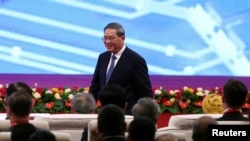Beijing opposes protectionism and wants to strengthen supply chains with all countries, Premier Li Qiang said Tuesday, as a growing number of nations voice concern about how much their supply chains depend on China.
In a speech opening the five-day first International Supply Chain Expo on Tuesday, Li said, "China is not only a participant and beneficiary of global industrial and supply chain cooperation, but also a firm defender and builder."
Li offered a four-point proposal including, "all parties should jointly build open and inclusive industrial and supply chains, and unequivocally oppose protectionism and all forms of decoupling and disruption of industrial and supply chains."
China is holding the expo after moves this year by U.S. and European Union companies to "de-risk" their supply chains by leaving China, even as Beijing has appealed to them to stay.
But geopolitical tensions, such as Russia's war in Ukraine and concerns over a possible Chinese invasion of Taiwan, leave companies that remain in China wary of expanding. Instead, they are investing in countries with stronger ties to the United States, such as Vietnam.
Zhang Shaogang, deputy chairman of the China Council for the Promotion of International Trade, an expo co-host, said in a press briefing on November 21 that 515 companies and organizations from 55 countries and regions would attend the event.
Overseas attendees accounted for 26% of the 515 companies and organizations, and of that group, about a fifth are from the U.S.
"There are many industry leaders," Zhang said. "A number of Fortune 500 and multinational companies, such as Amazon, ExxonMobil, Apple, Tesla, Qualcomm, will be sending senior representatives to the conference."
The overseas turnout masked a significant change for China: the flight of foreign capital. Foreign direct investment stood at minus $11.8 billion in the third quarter, according to data published by the State Administration of Foreign Exchange on November 3. In the third quarter of 2022, China's direct investment liabilities stood at $14.1 billion.
This is the first time in the 25 years of recordkeeping that there's been a negative flow, according to data compiled by Refinitiv Eikon, a financial database, and reported by CNN.
Wang Hsiu-wen, an assistant researcher at the Institute for National Defense and Security Research in Taipei, told VOA Mandarin in a phone interview on Tuesday that China has to face the fact that its investment environment is deteriorating.
"Foreign businesses like Apple are leaving China. What China is saying is: We have advantages in new industries, please invest back, we have opportunities, and China is a huge market," Wang said.
Tsai Ming-fang, a professor in the Department of Industrial Economics at Tamkang University in New Taipei, told VOA Mandarin in a phone interview on Monday he believes the Chinese government's wide "anti-espionage" campaign has accelerated the departure of many foreign businesses from China.
China's economic weakness also makes foreign businesspeople wary. In October, the World Bank said in its semiannual regional forecast that it now expects China's economic output to grow 4.4% in 2024, down from the 4.8% it expected in April.
Tsai told VOA Mandarin, "In the past, everyone's supply chain depended on China because there's a China market. Now that market demand is gone. The necessity of China supply chain has also been greatly reduced, so they are beginning to transfer to Vietnam, India, Mexico. The trend is very obvious."
Just hours before the Beijing expo opened on Tuesday, U.S. President Joe Biden convened the inaugural meeting of the White House Council on Supply Chain Resilience in Washington.
Some information in this report came from Reuters.






